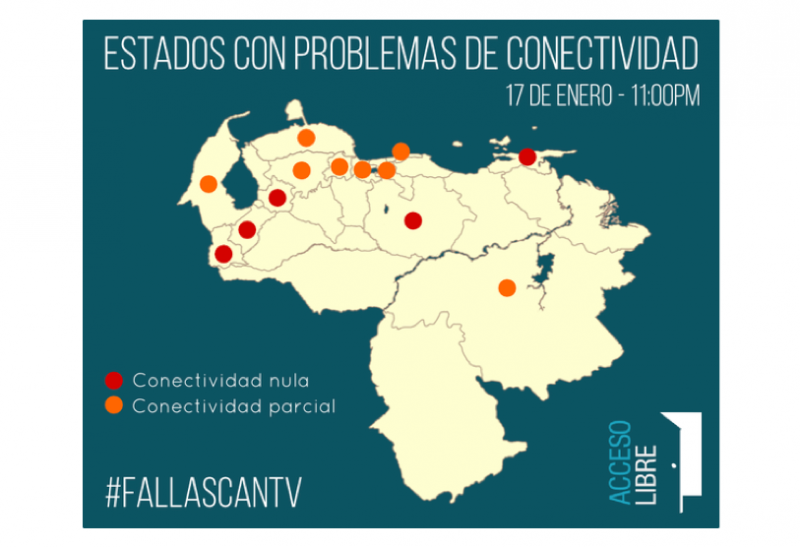
Venezuela web outage map by Acceso Libre, used with permission.
Ellery Roberts Biddle, Marianne Diaz, Weiping Li, Hae-in Lim, Sonia Roubini and Sarah Myers West contributed to this report.
Global Voices Advocacy's Netizen Report offers an international snapshot of challenges, victories, and emerging trends in Internet rights around the world. This week's report begins in Venezuela, where Internet users in multiple provinces reported in high volume that they were unable to get online through CANTV, the nation’s leading Internet service provider, for approximately 12 hours between Jan. 16 and Jan. 17. Owned by the Venezuelan government, CANTV is the dominant ISP in Venezuela and captures roughly 80 percent of the local market.
Telecommunications officials tweeted that the service failure was caused by a technical problem with national domain name system servers, but this left local technical experts scratching their heads—the nation’s other ISPs registered no disruption in service. Given the country’s increasingly fraught environment for civic engagement and speech, whether online or off, many citizens are second-guessing CANTV’s explanation. Writing for the independent news site elespectaculo.com, Arnaldo Espinoza noted that the possible block coincided with the return of embattled president Nicolas Maduro from a tour during which he visited China, Iran, and Saudi Arabia, chiefly to negotiate new trade terms for crude oil.
Post-Charlie censorship in Turkey
A Turkish court ordered telecommunication authorities to block several news sites showing the latest cover of French magazine Charlie Hebdo. The cover, which the magazine published just a week after experiencing a brutal terrorist attack on its offices, featured the image of the prophet Muhammad in tears and holding a sign saying “Je suis Charlie.” Twitter users in Turkey were divided over the news, with some expressing support and others outrage over the blockings. The hashtag #ÜlkemdeCharlieHebdoDağitilamaz (“Charlie Hebdo cannot be distributed in my country) reached the top of trending topics on Twitter on Wednesday.
Debate over the issue continued across Europe in the week following the attacks. French comedian Dieudonne M’bala M’bala, who is of Cameroonian descent, was arrested on charges of being an “apologist for terrorism” for remarks he made on Facebook concerning one of the assailants in the Charlie Hebdo attack. Known for politically-charged and anti-semitic provocations, M’bala M’bala wrote in response: “I am considered a Amedy Coulibaly while I'm no different from Charlie.” He is currently in police custody.
China bans websites, WeChat pages for “impersonating” the government
In their latest effort to crack down on online speech, Chinese authorities shut down 24 websites, 17 public pages on social messaging app WeChat, and nine channels or columns on websites for offenses including “impersonation of the government or media,” publishing pornography, and “publishing political news without a permit,” according to the Cyberspace Administration of China.
Lashings for Saudi blogger are on hold, for now
The case of Raif Badawi, the Saudi blogger sentenced to 10 years’ jail time and 1,000 lashes, has been referred to the Supreme Court by King Abdullah. The punishment caused a public outcry for what Amnesty International called its “outrageous inhumanity.” A second round of lashings, expected to be carried out this week, was postponed on his doctor’s recommendation.
Medium.com goes transparent
Publishing platform Medium released its first transparency report covering all requests made to the company in 2014. The site received no national security letters or demands from law enforcement for user information or content removal. Medium did receive several requests to remove content that allegedly violated copyright laws. In six of these cases, content was removed. In one, material was removed but later restored.
Pirate shenanigans in Sweden
Swedish Pirate Party youth wing chairman Gustav Nipe pulled off a clever act of protest against mass surveillance at a major Swedish security conference. Nipe tricked attendees into revealing their web traffic by logging into a networked labeled “Open Guest”. Nipe wrote:
The operation we have performed during the two conference days in Salen based on the same principle as the great spy organizations such as the US NSA and the Swedish FRA uses. The difference is that they sign a year round operation, and to a much greater extent.
New Research
• Revolution Decoded: Iran’s Digital Media Landscape – Small Media




1 comment